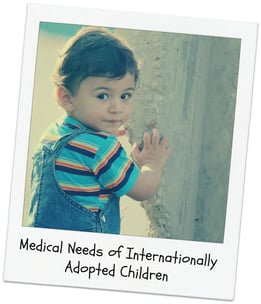
You have just been approved to adopt a child living in an international orphanage. You will soon travel to meet them and bring them home. There are some things to consider when you plan out the next steps of your adoption. Internationally adopted children can be at risk for many diseases simply because of their living conditions and many children are coming home with significant special needs. Children in an international orphanage are likely living in impoverished conditions with inadequate nutrition and medical care. They often are not exposed to the stimulating educational toys needed to help them develop and grow. They may have suffered trauma or been exposed to diseases and parasites. It is very important that you consider their medical care when they arrive home. There are many pediatricians that specialize in the care of internationally adopted children and they can help you provide the best medical care for your child. Soon after arriving home your child will need to be evaluated by a medical professional.
Where To Start:
- Make an appointment before you travel for 2 to 3 days after you arrive home.
- You will want to seek out a medical professional that specializes in internationally adopted children. This person does not necessarily have to be your child’s permanent pediatrician if they are a long distance from your home but they can be the best place to start. A pediatrician familiar with internationally adopted children can run the proper tests, screen for the appropriate parasites and understand the unique needs of a children who has grown up in an institutional setting.
- If your child has special needs it is good to start with a visit to a pediatrician who can refer you the appropriate specialist. They can help you to coordinate the medical care your child may need.
At this exam your pediatrician should:
- Review your child’s medical history and all related information you may have on the child and their life before adoption. This should include your child’s immunization records.
- Complete a thorough physical exam to ensure nothing is being missed or overlooked. Many diseases can go for a long period of time before showing signs and symptoms, often making it more difficult to treat or cure.
- Order laboratory tests that may include but are not limited to screening for parasites, anemia, lead levels, blood disorders, metabolic disorders, vitamin deficiencies, tests for infectious diseases and other risk factors your child may have. If testing has been done in a foreign country, rerunning those tests could be crucial as many countries do not have the same standards of testing that is here in the United States. Blood work testing for titers can also be beneficial as there may be inadequately recorded immunization information or the immunizations could have been administered improperly.
- There should also be developmental screenings, vision, dental and hearing examinations to be sure there are no underlying problems.
- If there are behavioral concerns your child should see the appropriate medical professional for evaluation. This can help you give your child the best start in their new life with you. There is an extensive list of things your child could have been exposed to or experienced before becoming your child. Understanding and accepting the risks of international adoption is one of the first steps to giving your child all they need to succeed.
- In some cases children adopted internationally may not have an accurate date of birth. There may be questions about a child’s true age and this can have an impact on the child’s educational placement and their qualification for extra services through the school.
Many times a regular family pediatrician will not order the extensive screenings and tests that need to be done. This simply comes from a lack of experience with internationally adopted children. These children do have unique needs and they need specialized medical care. It is important to insist on this testing being done. An ounce of prevention now could prevent a pound of problems later. Your adoption agency should be able to provide you with information regarding pediatricians specialized in the needs of internationally adopted children and the specialized services in your area.
Providing your newly adopted child with the best medical professional could give them the new start in life they need.
If you would like more information about the medical evaluation process for adopted children you can view an article from the American Academy of Pediatrics: Comprehensive Health Evaluation of the Newly Adopted Child.
This information is not intended for medical advice but simply to provide adoptive parents with the information necessary to bring to light the special needs of adopted children and the availability of services to help give their newly adopted child the best start in life. Please refer to your pediatrician for medical advice and care.
For a list of medical specialist and clinics in the United States and Canada that have experience with internationally adopted children please see: http://www.comeunity.com/adoption/health/clinics.html
For other resources check out Family Connections' Resource page http://www.adoptfamilyconnections.org/international-adoption-placement-agencies
If you would like more information about the medical evaluation process for adopted children you can view an article from the American Academy of Pediatrics: Comprehensive Health Evaluation of the Newly Adopted Child.
Please feel free to contact Family Connections with questions on the adoption process at 607-756-6574
Information in this blog can be found in the following article:
"Comprehensive Health Evaluation of the Newly Adopted Child." Table of Contents. N.p., n.d. Web. 27 July 2016.


Let Us Know What You Thought about this Post.
Put your Comment Below.